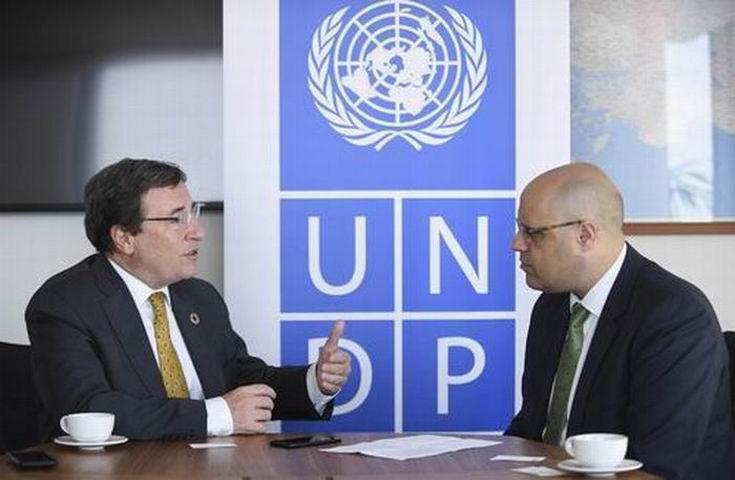Turkey a ‘beacon of hope’ for refugees, UNDP says
SERKAN DEMİRTAŞ- ANKARA

The head of the United Nations Sustainable Development Group praised Turkey on May 28 for its vital role and exemplary performance in hosting some 3.5 million refugees.
Despite all the debates and negative sentiments around refugees, “Turkey, the people of Turkey stood out as an extraordinary beacon of hope and inspiration. That’s not something I say lightly, but truly mean it. I think the world has to recognize this every day,” UNDP Administrator Achim Steiner said in an exclusive interview with Hürriyet Daily News on May 28.
“From the point of view of the U.N., having a nation such as Turkey become a major supporter of development cooperation and humanitarian aid is vital because the crises are growing and the number of people in need through conflict and natural disasters is growing every year. We are overstretched our capacities and resources are not growing in line with crises. So we welcome Turkey’s increased engagement and partnership.”
Steiner paid a two-day trip to Turkey to meet senior Turkish officials and to participate in Istanbul Development Dialogues, an initiative being carried out in coordination with the Turkish government and the UNDP.
“The commitment of Turkey to working with the U.N. and to being a significant partner to the U.N., not just UNDP, indeed in the humanitarian field is a very significant and positive signal,” Steiner stated.
Turkey and the UNDP broadened and expanded the scope of their partnership after a deal signed in 2011 that paved the way for the latter to establish a regional support center and a hub in Istanbul from where work throughout Europe and Central Asia is now coordinated. That agreement has been interpreted as Turkey’s signal and interest in a more active engagement internationally as a development partner.
Describing the hub in Istanbul as a success story, the UNDP administrator said: “Our Istanbul hub, today, has more than 200 staff serving our offices, not only within the larger region but also well beyond European and Central Asian region. We have expertise, we have a private sector strategies center there, and a significant part of our global innovation work is being incubated in our Istanbul team.”
Istanbul benefits, too
The UNDP’s offices in Istanbul is also beneficial for the economy of Turkey’s largest metropolis, Steiner said. About 50 to 60 major international conferences dedicated to development issues convene in this city annually, he added.
Not only Istanbul’s but Turkey’s economy and the private sector also benefit from the partnership with the UNDP, Steiner said.
“Turkey’s engagement has also bilateral partners, for example, in the region, central Asia and over the last 10 years in the African continent. Clearly, it has created a very dynamic set of relationships which both from public policy and political engagement have raised the profile of Turkey. Also Turkey’s private sector and its economy has been beneficial,” he stated.
Turkey’s enormous burden of refugees
Turkey and the UNDP, and the U.N. in general, have expanded their cooperation within the context of the Syrian crisis and Turkey’s enormous burden of hosting more than 3.5 million Syrians on its soil, he added.
“Let me first say this: I, together with many others at the U.N. family, have the deepest admiration for the Turkish people because the display of solidarity and their willingness to welcome and embrace people who very often have fled trauma and absolute catastrophe was not only exemplary, attached is something that defines us human beings,” he said.
‘The spirit of a nation’
It’s also exemplary that Turkey has tried to create conditions for the refugees to find accommodation and live in cities so that they are not trapped in camps for years, the UNDP head said, drawing attention to the investments and the financing that was provided to thousands of Syrians to develop skills and become productive.
“I want to come back to the Turkish people, because, at the end of the day, it’s not just the government that defines this. It’s actually the spirit with which a nation embraces this challenge of hosting so many refugees. It deserves our admiration,” Steiner emphasized.
Recalling Turkey’s calls for more international support and solidarity and ongoing discussions to this end, the UNDP administrator emphasized that “The U.N. has been deeply committed to working with Turkey. We are conscious of the fact that our support does not yet live up to the expectations and needs that are there. So we acknowledge both. I think we need to do more. My commitment is asserted to seek for more opportunities to do that.”
Stick to long-term goals on development
On Turkey’s performance concerning fulfilling 2030 sustainable development goals set by the U.N., the administrator advised that Turkey should continue to address multiple dimensions of development, namely the economic, the environmental and the social ones, with an emphasis on overcoming discrimination between men and women, rural and urban, and younger and older generations.
“Managing the inequality challenges of development while accelerating economic progress is a critical part that I think Turkey is not walking away from despite the economic challenges,” Steiner said.
It’s a fact that Turkey is passing through an economic stress and is in an effort to ensure that it can determine own economic pathway forward through a focus on monetary and fiscal policies, Steiner stated.
“It’s a difficult period in that respect. We are all conscious of the fact that it’s not an easy moment for all of the Turkish citizens who are being affected by economic conditions but also from a national government point of view,” he maintained. “I hope policies that have been set out to deal with short-term economic challenges will remain aligned with the longer term development goals.”
















